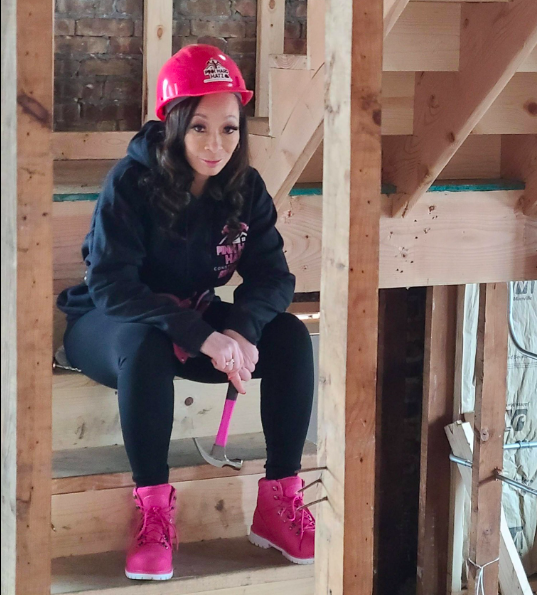Sashe Ivy is looking to change the stigma around the male-dominated construction industry. Women only make up 10 percent of construction workers, according to the U.S Bureau of Labor Statistics. Taking initiative in her own city, the Inglewood, Chicago native currently trains and employs women contractors through her company, Pink Hard Hatz Construction. She grew tired of women not be considered for jobs as much as men.

“I was sitting in a meeting. Once again, it was all-male contractors. And I thought about … females can do this,” Ivy said this year to Localish, an ABC affiliate in Chicago.
Introducing Pink Hard Hatz Construction
According to the outlet, Pink Hard Hatz Construction is the largest female minority construction company in Chicagoland and Northwest Indiana. No job is too big or too small for this full-service, licensed, and bonded company and team of women construction workers and electricians. Their services include everything from sanding walls to restructuring fireplaces and carpentry to prepping walls for paint. The ladies deliver affordable prices and even remodel bathrooms and kitchens for residential and commercial properties — all while wearing pink hard hats and matching boots.
Ivy noted that some customers fear working with male contractors due to mistreatment or receiving insufficient work on their property.
“People, especially women and seniors, they want to see a woman. They’re tired of giving a deposit, being taken advantage of or the person don’t come back and do the work,” she said.
As company owner, she supervises her staff from beginning to end, ensuring customers receive the best customer service and workmanship possible. Her 15 years of experience in the industry supports her partnership with Chicago Women in Trades. The local nonprofit organization helps women learn construction skills in trade schools as opposed to attending four years of college.
Empowering Women in the Industry
Ivy’s daughter, Kennedy Lawson, also appeared during the interview to brag about her mother empowering a city of women. She noted the rarity many experience when seeing women as electricians, plumbers, and construction workers opposed to being teachers and nurses.
“But if you see a woman, it’s like, ‘Wow this is really different and this is a change,’ said Lawson, before revealing her future plans. “Hopefully, in the future, I’ll learn more and be able to learn how to do that stuff myself.”
Ivy added, “It don’t hurt you to try something different. Don’t let anyone stop you from your dreams and your goals.”
Women’s experience working in construction spaces differs from that of men. There are reports of women receiving lower wages for a job or being sexually harassed or assaulted by co-workers and supervisors while at work.
During an interview with ABC News, advocate Tierra Williams revealed she was terminated after reporting an incident to her supervisor.
“There’s no #MeToo movement for us. I don’t think that I was famous enough or I didn’t have a complaint against someone that was famous enough,” the New York woman told the outlet two years ago. “We’re just women in construction. We just do labor work. We get dirty like everyone else. I just think they think we’re low budget so we don’t matter.”




